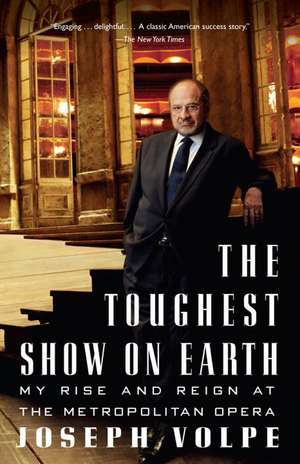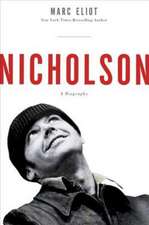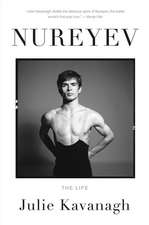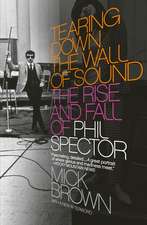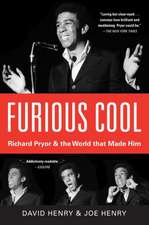The Toughest Show on Earth: My Rise and Reign at the Metropolitan Opera
Autor Joseph Volpe Charles Micheneren Limba Engleză Paperback – 30 sep 2007
Joseph Volpe gives us an anecdote-filled tour of more than four decades at the Met, an institution full of vast egos and complicated politics. With stunning candor, he writes about the general managers he worked under, his embattled rise to the top, the maneuverings of the blue-chip board, and his masterful approach to making a family of such artist-stars as Luciano Pavarotti, Placido Domingo, Teresa Stratas, and Renee Fleming, and such visionary directors as Franco Zeffirelli, Robert Wilson, and Julie Taymor. Intimate and frank, The Toughest Show on Earth is not only essential for music lovers, but for anyone who wants to understand the inner workings of the culture business.
Preț: 125.13 lei
Nou
Puncte Express: 188
Preț estimativ în valută:
23.95€ • 24.74$ • 19.93£
23.95€ • 24.74$ • 19.93£
Carte tipărită la comandă
Livrare economică 25 martie-08 aprilie
Preluare comenzi: 021 569.72.76
Specificații
ISBN-13: 9781400096756
ISBN-10: 1400096758
Pagini: 304
Ilustrații: 79 PHOTOS
Dimensiuni: 134 x 203 x 17 mm
Greutate: 0.3 kg
Ediția:Reprint
Editura: Vintage Books USA
ISBN-10: 1400096758
Pagini: 304
Ilustrații: 79 PHOTOS
Dimensiuni: 134 x 203 x 17 mm
Greutate: 0.3 kg
Ediția:Reprint
Editura: Vintage Books USA
Notă biografică
Joseph Volpe was born in Brooklyn. He joined the Metropolitan Opera in 1964 and was its general manager for sixteen years. He lives in New York City with his wife, the former ballet dancer Jean Anderson Volpe, and their daughter.
Charles Michener was senior editor for cultural affairs at Newsweek and senior editor at The New Yorker and has written widely on music for many publications. He collaborated with Robert Evans on The Kid Stays in the Picture and was coauthor with Peter Duchin of Ghost of a Chance. He lives in New York.
Charles Michener was senior editor for cultural affairs at Newsweek and senior editor at The New Yorker and has written widely on music for many publications. He collaborated with Robert Evans on The Kid Stays in the Picture and was coauthor with Peter Duchin of Ghost of a Chance. He lives in New York.
Extras
1
“BE PATIENT”
My maternal grandmother, Marianna Cavallaro, spoke no English, and whenever she came to babysit for me and my sisters while our parents were out, she’d go over to a shelf in the living room, take down a record album, and say to me in Italian, “Joey, put this on.”
I was only five or six, and carrying the bulky volume of 78s over to the Victrola wasn’t easy. But I liked climbing up on a stool, removing a shiny black disc from its sleeve, hearing it plop into place, and then positioning the needle in the groove. My grandmother always sat in the same place—an armchair with a straight back that made it impossible to slouch. She wanted me to sit nearby on the sofa, perfectly still. But I hated sitting still. Once the music started and my grandmother closed her eyes, I slid down to the floor, leaned against the sofa, and imagined myself somewhere else.
The music was always the same—Mascagni’s one-act opera Cavalleria Rusticana, which is set in a Sicilian village like the one from which my grandmother had come to America, not long after the opera was written, at the turn of the century. Nobody told me that this was “opera.” Even if anyone had, I wouldn’t have paid attention. This music belonged to my grandmother. It made her happy. She always insisted on listening to the whole album—there were perhaps eight or ten discs—and she never fell asleep. I guess she picked that particular chair so she wouldn’t miss a note.
I couldn’t fall asleep either. Before I knew it, the needle had reached the center of the disc, the loud, scratchy voices had stopped, and my grandmother was saying quietly in Italian, “Change the record, Joey.”
Looking back, I find it interesting that my grandmother never asked my older sister, Joan, to participate in those musical séances—this was a job only for me. Was she sending me a message? Was this how it all began?
The thought that I could one day run The Metropolitan Opera first crossed my mind when Rudolf Bing retired as general manager in 1972. At the time, I was still only master carpenter, in charge of the seventy or eighty men who set up and dismantled The Met’s stage for every performance. I’d wrestled with budgets. I’d demonstrated a knack for learning quickly on the job. I was good at solving problems and handling emergencies. I felt I knew better than anyone how The Met worked, mechanically and logistically.
The Met is the biggest performing arts institution in the world. Every year it presents some 240 performances of thirty or so different operas, each with an international cast and elaborate sets. It employs more than two thousand people and has annual operating expenses of more than $220 million. To keep it going requires not just the muscle and the know-how of carpenters, stagehands, painters, designers, electricians, and prop men, but also the skills of musicians, singers, vocal coaches, dancers, ballet masters, stage directors, conductors, artistic administrators, marketing and publicity people, and the efforts of The Met’s board of directors, which raises the funds to pay for what the box office doesn’t. In 1972, I didn’t really understand how many of those jobs were done. Nor did I have the slightest idea how Rudolf Bing had managed to coordinate everyone during the two decades he’d been in charge.
Still, I thought that the top job at The Met—which means the top job in the opera world—was not out of reach. I felt that in some mysterious sense I’d been chosen by Rudolf Bing himself. Not that he ever hinted as much. He was too much the aristocrat, out of a Viennese operetta. But on more than one occasion, he’d taken me aside to offer advice in a way that suggested he had bigger things in mind for me.
One of our earliest encounters took place at the end of my first season as master carpenter. In those days, The Met went on an eight-week tour every spring. Boston, Cleveland, Atlanta, Memphis, Dallas, Minneapolis, Detroit—for years the company had been playing to packed houses beyond the Hudson River. That year, we opened with La Gioconda in Atlanta. The stars were the soprano Renata Tebaldi and the tenor Franco Corelli. After the performance, Mr. Bing came backstage and said, “Mr. Volpe, I’d like to see you in the morning.”
The next morning, he led me into one of the principals’ dressing rooms and closed the door. “Mr. Volpe,” he said, “I think you’re doing a wonderful job. I’m going to give you a raise of fifty dollars a week.” That came as a huge relief, but then he said, “So how did Mr. Corelli do last night?”
“Excuse me?” I said.
“How was his behavior backstage?”
Before a performance, Franco Corelli was always a wreck, complaining that his girdle was too tight or fighting with his wife, Loretta, who never left his side until he was able to summon the courage to make his entrance. “You didn’t notice?” Mr. Bing went on. “Franco Corelli, one of the most important tenors in the world, and you didn’t notice?”
“I guess I was too busy with the scenery.”
“Well,” Mr. Bing said, “the next time I ask you about Mr. Corelli’s behavior, you will have noticed!”
Rudolf Bing had his finger on the pulse of The Met. His retirement, after the 1971–1972 season, gave way to twenty years of turbulence. First came the death of his successor, Goeran Gentele, in a car crash in Sardinia. This was followed by a brief, rudderless period under Gentele’s assistant, Schuyler Chapin. Next came the stormy triumvirate of John Dexter, the brilliant head of production; James Levine, the boy-wonder music director; and Anthony Bliss, a patrician estate lawyer who ran The Met out of a sense of family duty. Those years were marred by backstage intrigue, financial instability, and bitter fights with The Met’s seventeen unions, culminating in the cancellation of the 1980 fall season—a labor lockout ordered by The Met’s imperious board. The brief reign of Levine as artistic director and of Bruce Crawford, a smooth, opera-loving advertising executive, as general manager, began in 1985. Bruce became something of a godfather to me. I admired his velvet manner, but it wasn’t a style I would emulate.
Along the way, I’d been promoted from master carpenter to technical director to operations director (responsible for backstage budgets and labor negotiations) to assistant manager (in charge of everything except artistic matters and fund-raising). None of these advancements came without an objection from someone higher up; in each case, I had to swallow my pride. But I had been at the center of everything—watching, learning, and not keeping my mouth shut. In 1988, Crawford decided to return to Madison Avenue. I felt that I was his logical successor. Instead, The Met’s board chose an arts bureaucrat named Hugh Southern whose only qualifications for running the company seemed to be that he’d never seen the front office of a great opera house—but he sported an English accent, courtesy of Cambridge University. Those qualifications turned out to be not quite enough. Southern was dismissed after seven months.
In the summer of 1990, Crawford, who was now the chairman of The Met’s executive committee, came into my office to tell me that I was being promoted to “general director.” For a moment I was speechless. Then I snapped, “Why not ‘general manager’?”
Bruce explained that the board had decided to reinstate the triumvirate model of management. I would run the house internally. Jimmy Levine would remain artistic director. Marilyn Shapiro, who had been in charge of marketing and development, was now executive director for external affairs. We would all report to the president of the board, Louise Humphrey, a Cleveland heiress who had a plantation in Florida, a horse farm in Kentucky, and a summer compound in Maine. Hugh Southern had gone quail shooting at Louise’s Florida spread. I’d never shot a quail in my life.
“Maybe I shouldn’t accept it,” I said.
“Joe,” Bruce said, “it will all come to you in the end.”
“Who gets the room at the end of the hall?” I asked, referring to the office from where Rudolf Bing had reigned.
Bruce said, “You’ll stay where you are. The general manager’s office will become a conference room.”
“That’s ridiculous,” I said. “It works perfectly well as a conference room right now—with a real general manager behind the desk. It’s like being asked to run The Met with one hand tied behind my back!”
“Trust me, Joe,” Bruce said. “It will all work out. Be patient.”
I knew that my blunt manner had ruffled a few feathers on The Met’s board. After one board meeting, Bruce had taken me aside and said, “Joe, what you have to say is right. But it’s the way you say it . . .”
During the search that coughed up Southern, I’d also heard that various board members were raising other objections about me. Would Volpe, the ex-carpenter, be able to talk to the singers? Would Volpe be able to “represent” The Met at gala fund-raising functions? Did Volpe have the right stuff . . . socially? Although my grandparents had come to America from the country where opera was born, I had never studied music. I didn’t have a degree in arts management. I’d barely graduated from high school.
Everything I knew about running an opera house I had figured out for myself, starting by using my hands. I’d stayed at The Met for twenty-five years because I’d come to love opera. The Met had been my undergraduate education, my graduate school, my Ph.D. program. I considered The Met “family.” Now I was supposed to take Bruce’s advice: “Be patient.”
For someone like me, that wasn’t going to be easy.
2
ALWAYS ON THE GO
In the den of my apartment in New York is a photograph of my parents’ wedding reception. The date is September 8, 1935. The setting is Trommer’s banquet hall at 1632 Bushwick Avenue, in Brooklyn. There are several hundred people in the high-ceilinged main dining room—the women with corsages, the men with slicked-down hair and dressed in double-breasted suits. At the head table are twenty-two people—the bride and groom and their immediate families. My parents—my mother in white satin, my father in white tie and tails—look happy and proud. There isn’t a blonde in sight.
And there isn’t an empty place. A thousand people were invited, and when some of them didn’t show up, my grandfather went outside and brought in strangers off the street. He wanted a full house. I would have done the same thing.
Basilio Cavallaro was born in 1881 in the mountain village of Cesarò, in Sicily. At the age of twenty-six he came to America, arriving at Ellis Island on March 17, 1907. Soon, he met and married my grandmother, Marianna Cerami, who had arrived the previous year from a similar Sicilian village, Petralia Soprana. They settled in Lower Manhattan, where my grandfather started a little storefront business that made men’s clothing. Another family photograph shows the shop as it was in 1914. B. CAVALLARO TAILORING CO. the letters read, and in front of the store is my mother astride a pony—one with a Sicilian pedigree, no doubt. My grandfather worked hard, enlarged his business, and in 1925 founded the Italian Coat Contractors Association, which eventually became the Greater Clothing Contractors Association, representing the interests of all the men’s clothing manufacturers in New York.
My grandfather had highly placed friends among the police and politicians, especially Mayor Fiorello LaGuardia, who was a frequent guest at the family’s three-story brick house in Jamaica, Queens. The only memento I have of my grandfather is his Colt revolver. I grew up with stories about how it had come in handy when mobsters tried to muscle in on the men’s clothing business.
My grandfather’s house had a big front porch, two stone lions on guard, a dark walnut stairway, and a dining room that seemed to stretch for miles. At Sunday dinners, my grandfather stood at the head of the table and surveyed his family, which included more aunts than I could count. Among his eleven children was my mother, who was born on July 16, 1911. She was baptized Fortunata Angela Carmela Cavallaro. There were always at least twenty people seated around big bowls of pasta under stuffed pheasants mounted above the sideboard. My grandfather was an avid hunter, and his favorite hunting companion was his Irish setter, Red. When Red was accidentally shot and killed by another hunter, the wailing around that table went on for hours.
As a little girl, my mother—like her mother—spoke no English. When she started going to school she was made to sit in the corner and wear a dunce cap. She eventually went to Hunter College, where she earned a master’s degree that enabled her to become a first-grade schoolteacher. Later, she taught in a predominantly black school in Glen Cove, Long Island, where she was known as a stickler for proper English. After my older sister was born, Mom wanted only English spoken in the house. No one could stop my father from speaking Italian. But Dad made it clear that none of his three children would learn Italian. After all, we were American.
My father’s parents were immigrants from Avellino, a town outside Naples. I was named after my paternal grandfather, Joseph Michael Volpe, who was as quiet and reserved as my grandfather Basilio was outgoing and gregarious. For most of his life he had a tailor’s shop in Red Bank, New Jersey. I remember very little about him or about my grandmother Nunziata, except that she was a great one for complaining about her health.
My father—his given names were Michael Joseph—was the oldest of five children. At a young age, he started Associated Clothing, which made men’s suits and overcoats. Before long, he had a small factory at 142–144 West Fourteenth Street, which had several hundred employees. (The building is now occupied by the Pratt Institute.) A few years later, he opened another factory in Atlantic City. My father did so well that he was able to pay the law school tuition of his favorite younger brother.
My uncle Joe went on to become an important Washington lawyer. He was the general counsel of the Tennessee Valley Authority and, later, the general counsel for the Atomic Energy Commission. In the latter job, he became a close adviser to J. Robert Oppenheimer, who led the team that built the first atomic bomb at Los Alamos. After the war, Uncle Joe was counsel to “Oppie” during the House Un-American Activities Committee hearings, at which the physicist was questioned about his prewar associations with the Communist Party. When Oppenheimer, who had a quick tongue, said something during a congressional hearing on atomic energy that made one of the commissioners, Lewis Strauss, look foolish, my uncle—a very judicious man—cautioned him to watch his mouth. When I grew older, Uncle Joe would have given me the same advice. Like Oppie, I probably wouldn’t have taken it.
From the Hardcover edition.
“BE PATIENT”
My maternal grandmother, Marianna Cavallaro, spoke no English, and whenever she came to babysit for me and my sisters while our parents were out, she’d go over to a shelf in the living room, take down a record album, and say to me in Italian, “Joey, put this on.”
I was only five or six, and carrying the bulky volume of 78s over to the Victrola wasn’t easy. But I liked climbing up on a stool, removing a shiny black disc from its sleeve, hearing it plop into place, and then positioning the needle in the groove. My grandmother always sat in the same place—an armchair with a straight back that made it impossible to slouch. She wanted me to sit nearby on the sofa, perfectly still. But I hated sitting still. Once the music started and my grandmother closed her eyes, I slid down to the floor, leaned against the sofa, and imagined myself somewhere else.
The music was always the same—Mascagni’s one-act opera Cavalleria Rusticana, which is set in a Sicilian village like the one from which my grandmother had come to America, not long after the opera was written, at the turn of the century. Nobody told me that this was “opera.” Even if anyone had, I wouldn’t have paid attention. This music belonged to my grandmother. It made her happy. She always insisted on listening to the whole album—there were perhaps eight or ten discs—and she never fell asleep. I guess she picked that particular chair so she wouldn’t miss a note.
I couldn’t fall asleep either. Before I knew it, the needle had reached the center of the disc, the loud, scratchy voices had stopped, and my grandmother was saying quietly in Italian, “Change the record, Joey.”
Looking back, I find it interesting that my grandmother never asked my older sister, Joan, to participate in those musical séances—this was a job only for me. Was she sending me a message? Was this how it all began?
The thought that I could one day run The Metropolitan Opera first crossed my mind when Rudolf Bing retired as general manager in 1972. At the time, I was still only master carpenter, in charge of the seventy or eighty men who set up and dismantled The Met’s stage for every performance. I’d wrestled with budgets. I’d demonstrated a knack for learning quickly on the job. I was good at solving problems and handling emergencies. I felt I knew better than anyone how The Met worked, mechanically and logistically.
The Met is the biggest performing arts institution in the world. Every year it presents some 240 performances of thirty or so different operas, each with an international cast and elaborate sets. It employs more than two thousand people and has annual operating expenses of more than $220 million. To keep it going requires not just the muscle and the know-how of carpenters, stagehands, painters, designers, electricians, and prop men, but also the skills of musicians, singers, vocal coaches, dancers, ballet masters, stage directors, conductors, artistic administrators, marketing and publicity people, and the efforts of The Met’s board of directors, which raises the funds to pay for what the box office doesn’t. In 1972, I didn’t really understand how many of those jobs were done. Nor did I have the slightest idea how Rudolf Bing had managed to coordinate everyone during the two decades he’d been in charge.
Still, I thought that the top job at The Met—which means the top job in the opera world—was not out of reach. I felt that in some mysterious sense I’d been chosen by Rudolf Bing himself. Not that he ever hinted as much. He was too much the aristocrat, out of a Viennese operetta. But on more than one occasion, he’d taken me aside to offer advice in a way that suggested he had bigger things in mind for me.
One of our earliest encounters took place at the end of my first season as master carpenter. In those days, The Met went on an eight-week tour every spring. Boston, Cleveland, Atlanta, Memphis, Dallas, Minneapolis, Detroit—for years the company had been playing to packed houses beyond the Hudson River. That year, we opened with La Gioconda in Atlanta. The stars were the soprano Renata Tebaldi and the tenor Franco Corelli. After the performance, Mr. Bing came backstage and said, “Mr. Volpe, I’d like to see you in the morning.”
The next morning, he led me into one of the principals’ dressing rooms and closed the door. “Mr. Volpe,” he said, “I think you’re doing a wonderful job. I’m going to give you a raise of fifty dollars a week.” That came as a huge relief, but then he said, “So how did Mr. Corelli do last night?”
“Excuse me?” I said.
“How was his behavior backstage?”
Before a performance, Franco Corelli was always a wreck, complaining that his girdle was too tight or fighting with his wife, Loretta, who never left his side until he was able to summon the courage to make his entrance. “You didn’t notice?” Mr. Bing went on. “Franco Corelli, one of the most important tenors in the world, and you didn’t notice?”
“I guess I was too busy with the scenery.”
“Well,” Mr. Bing said, “the next time I ask you about Mr. Corelli’s behavior, you will have noticed!”
Rudolf Bing had his finger on the pulse of The Met. His retirement, after the 1971–1972 season, gave way to twenty years of turbulence. First came the death of his successor, Goeran Gentele, in a car crash in Sardinia. This was followed by a brief, rudderless period under Gentele’s assistant, Schuyler Chapin. Next came the stormy triumvirate of John Dexter, the brilliant head of production; James Levine, the boy-wonder music director; and Anthony Bliss, a patrician estate lawyer who ran The Met out of a sense of family duty. Those years were marred by backstage intrigue, financial instability, and bitter fights with The Met’s seventeen unions, culminating in the cancellation of the 1980 fall season—a labor lockout ordered by The Met’s imperious board. The brief reign of Levine as artistic director and of Bruce Crawford, a smooth, opera-loving advertising executive, as general manager, began in 1985. Bruce became something of a godfather to me. I admired his velvet manner, but it wasn’t a style I would emulate.
Along the way, I’d been promoted from master carpenter to technical director to operations director (responsible for backstage budgets and labor negotiations) to assistant manager (in charge of everything except artistic matters and fund-raising). None of these advancements came without an objection from someone higher up; in each case, I had to swallow my pride. But I had been at the center of everything—watching, learning, and not keeping my mouth shut. In 1988, Crawford decided to return to Madison Avenue. I felt that I was his logical successor. Instead, The Met’s board chose an arts bureaucrat named Hugh Southern whose only qualifications for running the company seemed to be that he’d never seen the front office of a great opera house—but he sported an English accent, courtesy of Cambridge University. Those qualifications turned out to be not quite enough. Southern was dismissed after seven months.
In the summer of 1990, Crawford, who was now the chairman of The Met’s executive committee, came into my office to tell me that I was being promoted to “general director.” For a moment I was speechless. Then I snapped, “Why not ‘general manager’?”
Bruce explained that the board had decided to reinstate the triumvirate model of management. I would run the house internally. Jimmy Levine would remain artistic director. Marilyn Shapiro, who had been in charge of marketing and development, was now executive director for external affairs. We would all report to the president of the board, Louise Humphrey, a Cleveland heiress who had a plantation in Florida, a horse farm in Kentucky, and a summer compound in Maine. Hugh Southern had gone quail shooting at Louise’s Florida spread. I’d never shot a quail in my life.
“Maybe I shouldn’t accept it,” I said.
“Joe,” Bruce said, “it will all come to you in the end.”
“Who gets the room at the end of the hall?” I asked, referring to the office from where Rudolf Bing had reigned.
Bruce said, “You’ll stay where you are. The general manager’s office will become a conference room.”
“That’s ridiculous,” I said. “It works perfectly well as a conference room right now—with a real general manager behind the desk. It’s like being asked to run The Met with one hand tied behind my back!”
“Trust me, Joe,” Bruce said. “It will all work out. Be patient.”
I knew that my blunt manner had ruffled a few feathers on The Met’s board. After one board meeting, Bruce had taken me aside and said, “Joe, what you have to say is right. But it’s the way you say it . . .”
During the search that coughed up Southern, I’d also heard that various board members were raising other objections about me. Would Volpe, the ex-carpenter, be able to talk to the singers? Would Volpe be able to “represent” The Met at gala fund-raising functions? Did Volpe have the right stuff . . . socially? Although my grandparents had come to America from the country where opera was born, I had never studied music. I didn’t have a degree in arts management. I’d barely graduated from high school.
Everything I knew about running an opera house I had figured out for myself, starting by using my hands. I’d stayed at The Met for twenty-five years because I’d come to love opera. The Met had been my undergraduate education, my graduate school, my Ph.D. program. I considered The Met “family.” Now I was supposed to take Bruce’s advice: “Be patient.”
For someone like me, that wasn’t going to be easy.
2
ALWAYS ON THE GO
In the den of my apartment in New York is a photograph of my parents’ wedding reception. The date is September 8, 1935. The setting is Trommer’s banquet hall at 1632 Bushwick Avenue, in Brooklyn. There are several hundred people in the high-ceilinged main dining room—the women with corsages, the men with slicked-down hair and dressed in double-breasted suits. At the head table are twenty-two people—the bride and groom and their immediate families. My parents—my mother in white satin, my father in white tie and tails—look happy and proud. There isn’t a blonde in sight.
And there isn’t an empty place. A thousand people were invited, and when some of them didn’t show up, my grandfather went outside and brought in strangers off the street. He wanted a full house. I would have done the same thing.
Basilio Cavallaro was born in 1881 in the mountain village of Cesarò, in Sicily. At the age of twenty-six he came to America, arriving at Ellis Island on March 17, 1907. Soon, he met and married my grandmother, Marianna Cerami, who had arrived the previous year from a similar Sicilian village, Petralia Soprana. They settled in Lower Manhattan, where my grandfather started a little storefront business that made men’s clothing. Another family photograph shows the shop as it was in 1914. B. CAVALLARO TAILORING CO. the letters read, and in front of the store is my mother astride a pony—one with a Sicilian pedigree, no doubt. My grandfather worked hard, enlarged his business, and in 1925 founded the Italian Coat Contractors Association, which eventually became the Greater Clothing Contractors Association, representing the interests of all the men’s clothing manufacturers in New York.
My grandfather had highly placed friends among the police and politicians, especially Mayor Fiorello LaGuardia, who was a frequent guest at the family’s three-story brick house in Jamaica, Queens. The only memento I have of my grandfather is his Colt revolver. I grew up with stories about how it had come in handy when mobsters tried to muscle in on the men’s clothing business.
My grandfather’s house had a big front porch, two stone lions on guard, a dark walnut stairway, and a dining room that seemed to stretch for miles. At Sunday dinners, my grandfather stood at the head of the table and surveyed his family, which included more aunts than I could count. Among his eleven children was my mother, who was born on July 16, 1911. She was baptized Fortunata Angela Carmela Cavallaro. There were always at least twenty people seated around big bowls of pasta under stuffed pheasants mounted above the sideboard. My grandfather was an avid hunter, and his favorite hunting companion was his Irish setter, Red. When Red was accidentally shot and killed by another hunter, the wailing around that table went on for hours.
As a little girl, my mother—like her mother—spoke no English. When she started going to school she was made to sit in the corner and wear a dunce cap. She eventually went to Hunter College, where she earned a master’s degree that enabled her to become a first-grade schoolteacher. Later, she taught in a predominantly black school in Glen Cove, Long Island, where she was known as a stickler for proper English. After my older sister was born, Mom wanted only English spoken in the house. No one could stop my father from speaking Italian. But Dad made it clear that none of his three children would learn Italian. After all, we were American.
My father’s parents were immigrants from Avellino, a town outside Naples. I was named after my paternal grandfather, Joseph Michael Volpe, who was as quiet and reserved as my grandfather Basilio was outgoing and gregarious. For most of his life he had a tailor’s shop in Red Bank, New Jersey. I remember very little about him or about my grandmother Nunziata, except that she was a great one for complaining about her health.
My father—his given names were Michael Joseph—was the oldest of five children. At a young age, he started Associated Clothing, which made men’s suits and overcoats. Before long, he had a small factory at 142–144 West Fourteenth Street, which had several hundred employees. (The building is now occupied by the Pratt Institute.) A few years later, he opened another factory in Atlantic City. My father did so well that he was able to pay the law school tuition of his favorite younger brother.
My uncle Joe went on to become an important Washington lawyer. He was the general counsel of the Tennessee Valley Authority and, later, the general counsel for the Atomic Energy Commission. In the latter job, he became a close adviser to J. Robert Oppenheimer, who led the team that built the first atomic bomb at Los Alamos. After the war, Uncle Joe was counsel to “Oppie” during the House Un-American Activities Committee hearings, at which the physicist was questioned about his prewar associations with the Communist Party. When Oppenheimer, who had a quick tongue, said something during a congressional hearing on atomic energy that made one of the commissioners, Lewis Strauss, look foolish, my uncle—a very judicious man—cautioned him to watch his mouth. When I grew older, Uncle Joe would have given me the same advice. Like Oppie, I probably wouldn’t have taken it.
From the Hardcover edition.
Recenzii
“Engaging . . . delightful . . . A classic American success story.”
—The New York Times
“This engaging volume will delight readers for whom opera is not only an art but also an endless fount of good gossip. . . . A rarity–one of those much-ballyhooed ‘insider books’ that actually delivers the goods.” —The Washington Post Book World
“Fascinating. . . . [Volpe’s story] has the golden glow of the American dream.”
—The New York Sun
“A gripping journey of personal and professional discovery.”
—Opera News
—The New York Times
“This engaging volume will delight readers for whom opera is not only an art but also an endless fount of good gossip. . . . A rarity–one of those much-ballyhooed ‘insider books’ that actually delivers the goods.” —The Washington Post Book World
“Fascinating. . . . [Volpe’s story] has the golden glow of the American dream.”
—The New York Sun
“A gripping journey of personal and professional discovery.”
—Opera News
